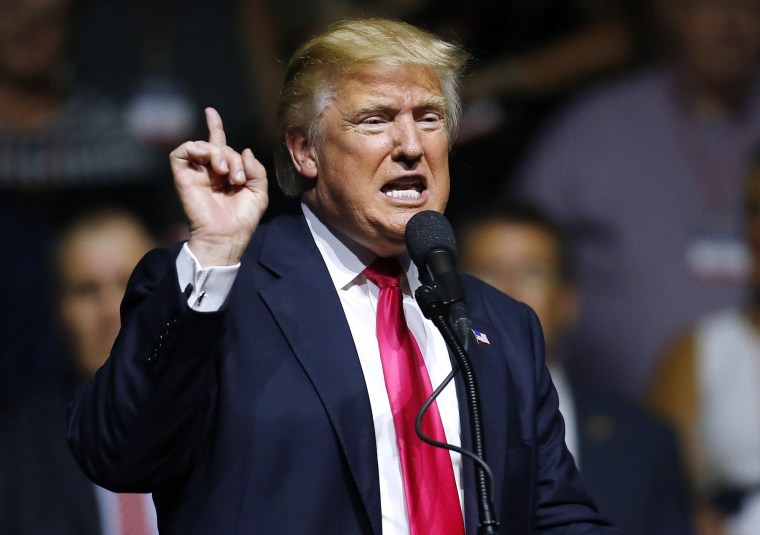Donald Trump’s physician hyperbolically describes the nominee’s health “excellent."
But beyond Dr. Harold Bronstein’s letter assessing Trump as having no "significant medical problems" and deeming him in advance "the healthiest individual ever elected to the presidency" should he win, there are few specifics and records to back that up.
Related: Trump Doctor Write Health Letter in Just 5 Minutes
That gap in specifics hasn't stopped Trump, however, from pointing out his opponents’ health risks throughout the 2016 campaign. Trump has attacked Hillary Clinton’s "stamina," Ben Carson and Ted Cruz’s mental stability, and Jeb Bush's "low energy."
The "low energy" barb, specifically, quickly became a classic Trump insult.
Trump branded his strongest opponent early on as someone lacking the necessary energy and zeal to be president.
"Let's assume someone else becomes president," Trump told his largest crowd to date last August in Mobile, Alabama. "Let’s assume a very low energy person. Very, very low energy. So low energy that every time you watch him, you fall asleep. Let's say — he said Hillary — Yeah, Hillary too. So let's say Jeb becomes president. Not good. Not good."
The nickname was soon picked up by supporters, many of whom began to refer to Bush as "low energy Jeb" when they spoke about him in interviews.
It wouldn’t be the first Trump-made descriptor that his fans picked up and adopted as their own.
Each time an opponent crept up on him in the primary polls, Trump’s attacks were swift, personal, and largely health-related. So it was for Dr. Ben Carson who, after pulling ahead in November in some Iowa polls, drew Trump’s most memorable ire of the primary when he mocked the neurosurgeon for anecdotes in his book and called him "pathological."
Of the man who is now one of his close advisers, Trump said in November that Carson wrote in his book that "he’s got basically a pathological disease ... I don’t want a person that’s got a pathological disease."
That night, he continued: "I'm not saying it, he says he’s got pathological disease. He actually said he’s got pathological temper and then he defined it as disease, so he said he has pathological disease. Now if you're pathological, there's no cure for that folks, OK, there’s no cure for that."
Then Trump equated Carson’s pathology to being a child molester. "There’s no cure for that," he told the crowd.
Related: 2016 Campaign Brings Alt-Right Out of the Shadows
The same went for Ted Cruz. "He’s seriously — he’s got a mental problem," Trump told Fox in February after Cruz had beaten him in Iowa and the duo’s political détente was officially over. “Ted Cruz is a liar. He’s got a problem. He’s a liar. I’ve never seen anybody lie to that extent.”
As the primaries dragged on, Trump had branded Cruz as "Lyin’ Ted" — another nickname that became a beloved joke and passionate chant from supporters at Trump’s rallies — further branding his opponent’s weak mental state to voters.
By May, Trump called Cruz "unhinged" under the stress of the campaign in a press release, saying in a statement that Cruz’s “outbursts" to the press further evidence Trump’s point that Cruz lacks the “temperament to the President.”
Now, Trump is rounding out his candidacy with his harshest, most pointed, and least founded allegations yet: repeatedly calling into question Hillary Clinton’s health.
Capitalizing on her comments that she "short circuited" an answer to Fox News about her truthfulness regarding her email server, Trump connected her words to a deeper health problem.
"She took a little short circuit in the brain and she's got problem,” Trump conjured during an August rally in Windham, New Hampshire. "I mean, if we had real people this would be a real problem for her. But I think that the people of this country don't want somebody that's going to short circuit up here. Ok. Not as your president, not as your president.”
Moments later, Trump bluntly stated “honestly, I don’t think she’s all there."
Related: How Trump Spent $8.4 Million to Play Digital Catch-Up
After an exclusive Nightly News interview with Trump’s doctor, in which he lauded the candidate’s health, Senior Communications Advisor Jason Miller told NBC News: "Mr. Trump has no problem releasing medical information if that is something Secretary Clinton is planning to do also."
Clinton also has yet to release her medical records. She has released a two-page letter from her doctor that said she has no serious issues.

